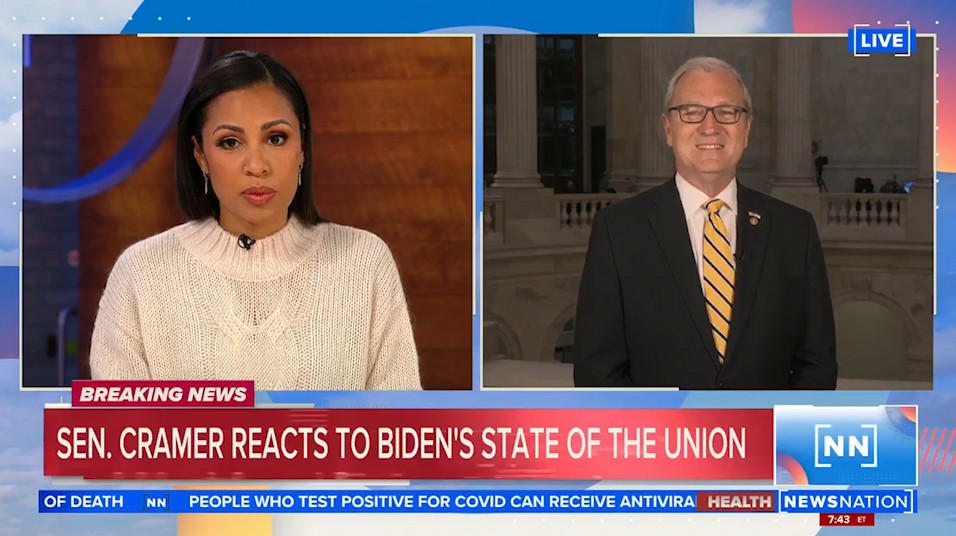***Click here to download video. Click here for audio.***
WASHINGTON – U.S. Senator Kevin Cramer (R-ND), member of the Senate Armed Services Committee, joined Adrienne Bankert on NewsNation Now’s Morning in America to discuss President Biden’s State of the Union address, the Biden Administration’s foreign policy, and the impact of Russia’s invasion of Ukraine on agriculture. Excerpts and the full video are below.
On the State of the Union:
“A lot of Republicans were heartened by the President's reference to police officers in calling out a pivot on funding the police. I think that was smart on his part. Certainly, I think Republicans can probably appreciate the line more than Democrats did.”
“Interestingly, in his references to immigration reform, he said ‘secure the border.’ Those are words we thought we’d never hear from a Democratic president again. I think that there is some opportunity there as long as both sides are willing to give a little to get what they want. I’ve often thought that we can be close to getting something on immigration if everybody would listen to each other and find the balancing point.”
On Biden’s Foreign Policy:
“He could have handled it in a much better way, starting with Afghanistan. I think what really emboldened Vladimir Putin was we saw how poorly President Biden handled Afghanistan—the botched withdrawal, the appeasement, handing over military bases to the Taliban, basically handing them the keys and leaving the equipment. When other world leaders and dictators saw that, [they thought] ‘well, this is going to be easier than we thought.’ I think Vladimir Putin was emboldened by that.”
“Remember, before President Trump, there was Barack Obama and Joe Biden was the Vice President. When Vladimir Putin went into Crimea and annexed it, Barack Obama and Joe Biden sent blankets. For four years, Vladimir Putin stayed in his lane. While President Trump had a working relationship, but also, remember President Trump signed the harsh sanctions on Russia that were passed by the bipartisan Congress and led by Republicans. If we had that same kind of leadership from Democrats in Congress, as Republicans provided under President Trump, it certainly could have made a difference. Nobody knows for sure what Vladimir Putin may have done, but certainly, this president didn’t handle it well at all.”
On Releasing Oil from the Strategic Petroleum Reserve:
“It's like a thimble in the ocean. Of course, it won’t. The best way to unleash oil reserves underneath things like the Permian Basin and the Bakken of North Dakota is bringing American energy production back online. Give the greenlight. Send the right market signals. Produce in the United States of America where we not only produce better, and with much higher labor standards and much higher environmental standards, we can actually reduce greenhouse gas emissions, put people to work, and have geopolitical leverage. Geopolitical leverage [President Biden] handed to Vladimir Putin when he greenlighted in the Nord Stream 2 pipeline, which became a weapon for Vladimir Putin. Releasing the reserves is for emergencies. In my view, we don't even really need those reserves like we used to need them because we have so much oil and gas in the United States. It's easily accessible if you send the right market signals and the right regulatory signals to the developers and producers.”
On Ukraine’s Impact on Agriculture and Inflation:
“I appreciate you asking that question and raising that point because energy gets a lot of the attention and rightfully so, but we cannot forget that Ukraine is the third leading producer of cereals in the world. There are a lot of business people that do business in North Dakota—agrarians and people in the agribusiness world—because it looks a lot like the breadbasket of the United States and Ukraine is the breadbasket in Europe. It could have a dramatic effect. Energy is always a leader in inflation because it's involved in every value chain and every supply chain, but so is food. You talk about two things everybody in the world needs. So it could be very disruptive to markets. We expect it would be. Now if you're a grain producer in the Midwest, you're going to get a higher price for your product, but you also pay a lot more for the input costs. So it'll be disruptive. Hopefully, I'm wrong, but I imagine it will be very disruptive as we head into the spring planting season now and harvest later in the year.”
